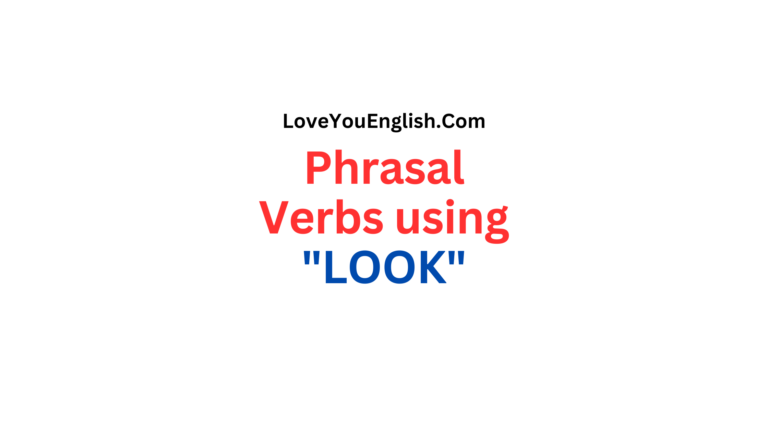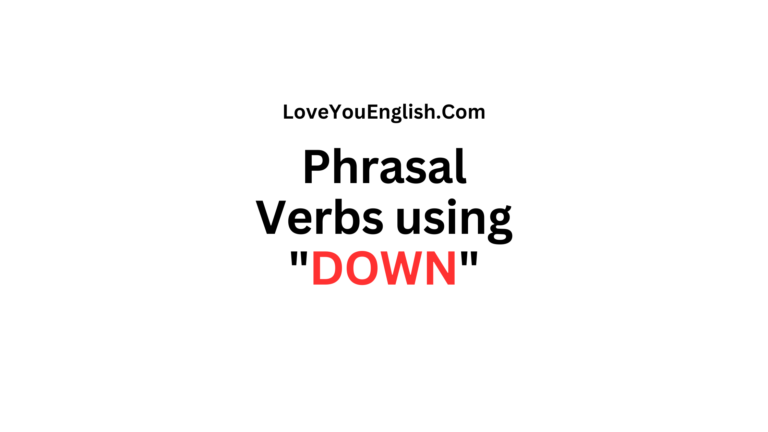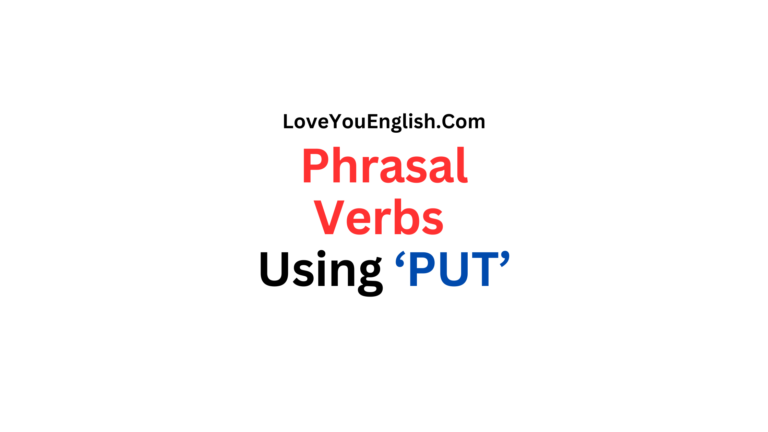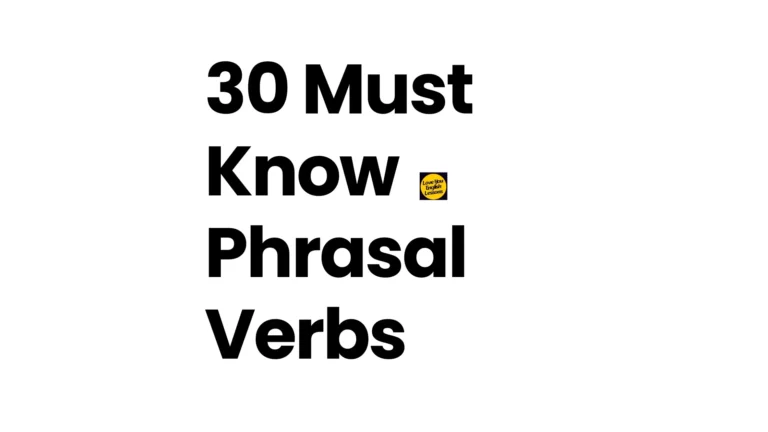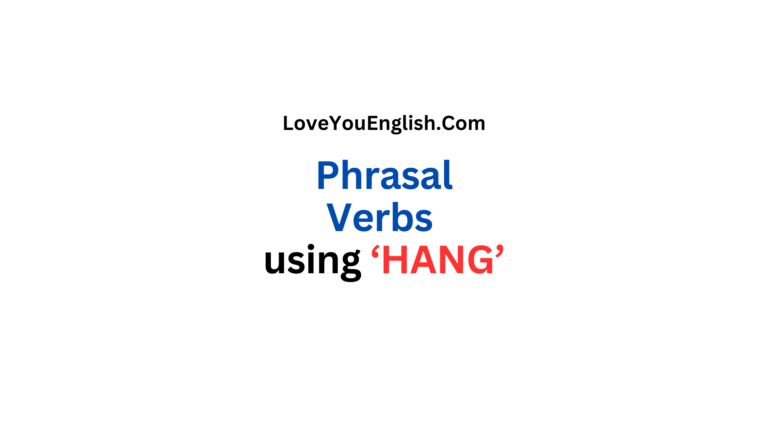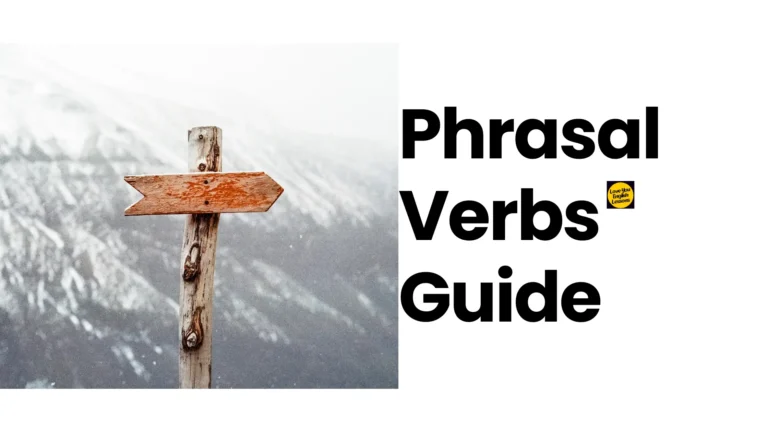Phrasal Verbs with “CALL,” along with their meanings
Phrasal Verbs with “CALL,” along with their meanings
What are phrasal verbs and how to use them?
Phrasal verbs are like the cool kids of the English language – they’re a combo of a verb and one or more prepositions or adverbs.
Think of them as those dynamic duos that spice up your conversations.
Using phrasal verbs can make your language more vivid and informal.
Instead of saying “look for,” you can jazz it up with “search for.” Or, swap out “give up” for the more laid-back “quit.”
Here’s the thing: sometimes the meaning of a phrasal verb isn’t obvious by just looking at the individual words.
You kinda need to get the vibe of it through usage.
Like, take “hang out.” It doesn’t mean hanging clothes; it means chilling with friends.
So, to really get the hang of phrasal verbs, you gotta pay attention to how people use them in context.
Also, don’t be afraid to experiment with phrasal verbs in your own speech. Just go with the flow, and soon you’ll be tossing them around like a language ninja.
So, kick back, have fun, and let those phrasal verbs add some flair to your English game!
Also read:
Phrasal verbs with “call” – 1
Call off
Meaning: To cancel or abandon something.
Example: The outdoor concert was called off due to the heavy rain.
Call on
Meaning: To visit someone.
Example: We decided to call on our friends while we were in the neighborhood.
Call up
Meaning: To contact someone by telephone.
Example: I’ll call up the restaurant and make a reservation for tonight.
Call out
Meaning: To shout or say something loudly.
Example: The teacher called out the student’s name to answer the question.
Phrasal verbs with “call” – 2
Call for
Meaning: To require or demand something.
Example: The situation calls for immediate action to be taken.
Call back
Meaning: To return a phone call or request.
Example: I left a message, and they promised to call me back within the hour.
Call in
Meaning: To request someone’s presence, usually at work.
Example: I’m feeling unwell, so I’ll call in sick and stay home today.
Phrasal verbs with “call” – 3
Call out for
Meaning: To request or order food for delivery.
Example: Let’s call out for pizza tonight; I don’t feel like cooking.
Call off
Meaning: To stop or discontinue an activity.
Example: The referee decided to call off the soccer match due to the bad weather.
Call for
Meaning: To predict or require a particular action.
Example: The current situation calls for a diplomatic approach.
Call on
Meaning: To ask for or request help or assistance.
Example: In times of crisis, we can always call on our neighbors for support.
Phrasal verbs with “call” – 4
Call at
Meaning: To stop briefly at a place.
Example: The train will call at several stations before reaching its final destination.
Call down
Meaning: To request or demand something forcefully.
Example: The protesters called down the government to address their grievances.
Call upon
Meaning: To request or ask for help or support.
Example: We may need to call upon our allies in times of need.
Call forward
Meaning: To request or signal someone to come closer.
Example: The speaker called forward the award recipients to the stage.
Phrasal verbs with “call” – 5
Meaning: To make a brief visit to someone.
Example: We decided to call in on our grandparents during our road trip.
Call out for
Meaning: To express a need or desire for something.
Example: The children’s laughter called out for a playground in the neighborhood.
Read more:
Call up
Meaning: To summon memories or emotions.
Example: The old photograph called up memories of our childhood vacations.
Call through
Meaning: To make a connection on the phone.
Example: I couldn’t call through to the office because of a poor signal.
Phrasal verbs with “call” – 6
Call around
Meaning: To contact multiple people or places to get information.
Example: I need to call around and find the best price for car repairs.
Call off
Meaning: To declare the end of an activity.
Example: The referee decided to call off the game due to unsafe playing conditions.
Call in
Meaning: To ask for or request assistance or expertise.
Example: We had to call in an expert to fix the plumbing issue.
Call out
Meaning: To challenge or criticize someone openly.
Example: The manager had to call out the employee for consistently being late.
Phrasal verbs with “call” – 7
Call over
Meaning: To ask or signal someone to come to where you are.
Example: The teacher called over the students to distribute the test papers.
Call away
Meaning: To request or take someone away from a place or activity.
Example: The urgent phone call called him away from the meeting.
Call by
Meaning: To visit briefly.
Example: I’ll call by your office later to drop off the documents.
Call for
Meaning: To publicly ask or demand something.
Example: The activists called for justice during the protest.
Phrasal verbs with “call” – 8
Call it a day
Meaning: To decide to stop working on something for the rest of the day.
Example: It’s getting late; let’s call it a day and continue tomorrow.
Call off
Meaning: To stop an activity or event that has already started.
Example: The referee had to call off the match due to a player injury.
Call to mind
Meaning: To remember or bring something into one’s thoughts.
Example: The old song always calls to mind memories of my school days.
Call it quits
Meaning: To agree to stop an activity or end a relationship.
Example: After hours of negotiations, they decided to call it quits and part ways.
Phrasal verbs with “call” – 9
Call for
Meaning: To publicly request or demand something.
Example: The citizens called for better infrastructure in their neighborhood.
Call on
Meaning: To invite or request someone to speak or contribute.
Example: The teacher called on the students to share their opinions on the topic.
Call the shots
Meaning: To be in control or make important decisions.
Example: In this project, the team leader gets to call the shots.
Call up
Meaning: To bring something to mind or remember.
Example: The photo album called up memories of a long-forgotten trip.
Phrasal verbs with “call” – 10
Call in
Meaning: To request someone to participate or contribute.
Example: We decided to call in a specialist to analyze the data.
Call for
Meaning: To require or necessitate a particular action.
Example: The emergency situation called for immediate attention from the authorities.
Call it off
Meaning: To decide not to proceed with a planned event or activity.
Example: Due to lack of interest, they had to call off the charity auction.
Call out
Meaning: To publicly criticize or denounce someone or something.
Example: The activist group called out the government for its lack of action on climate change.
Read more:
Phrasal verbs with “call” – 11
Call to order
Meaning: To formally begin a meeting or assembly.
Example: The chairperson called the meeting to order and outlined the agenda.
Call forth
Meaning: To evoke or summon a reaction, emotion, or response.
Example: The powerful speech called forth a standing ovation from the audience.
Call in
Meaning: To request or invite someone to come or participate.
Example: The radio show invited listeners to call in with their opinions on the topic.
Call off
Meaning: To withdraw or cancel an order.
Example: The company decided to call off the production of the unpopular product.
Phrasal verbs with “call” – 12
Call out
Meaning: To challenge or confront someone.
Example: The journalist called out the politician on the inconsistencies in their statements.
Call up
Meaning: To activate or summon someone to military service.
Example: Many young men were called up to serve in the army during the war.
Call back
Meaning: To return a phone call.
Example: I left a message, and he promised to call me back as soon as possible.
Call ahead
Meaning: To contact or inform in advance.
Example: I’ll call ahead to make sure they have a table available at the restaurant.
Phrasal verbs with “call” – 13
Call for
Meaning: To express a need for something.
Example: The project calls for creativity and innovation to be successful.
Call in
Meaning: To ask or require someone to report to a place, such as work.
Example: Due to the emergency, all employees were called in for a meeting.
Call up
Meaning: To evoke memories or feelings.
Example: The smell of the ocean always calls up memories of family vacations.
Call at
Meaning: To stop or visit briefly at a place during a journey.
Example: The cruise ship will call at several ports along the coast.
Phrasal verbs with “call” – 14
Meaning: To request or require something.
Example: The situation calls in for immediate action; we can’t delay any longer.
Call upon
Meaning: To request or demand the use or presence of something.
Example: In times of crisis, the community can call upon its resources for support.
Call around
Meaning: To consult or seek information from various sources.
Example: I need to call around and get quotes from different contractors for the home renovation.
Call ahead
Meaning: To notify or inform in advance.
Example: Before arriving at the airport, it’s a good idea to call ahead and check the flight status.
Phrasal verbs with “call” – 15
Call off
Meaning: To stop or abandon an ongoing activity.
Example: The search and rescue mission had to be called off due to adverse weather conditions.
Call upon
Meaning: To appeal or request for help, support, or action.
Example: The charity organization called upon the community to donate supplies for the disaster victims.
Call in
Meaning: To invite or request someone to participate or contribute.
Example: The radio show regularly calls in experts to discuss various topics.
Call on
Meaning: To visit or pay a brief visit to someone.
Example: We decided to call on our neighbors to welcome them to the neighborhood.
Phrasal verbs with “call” – 16
Call in
Meaning: To report to work or duty by phone.
Example: If you’re feeling unwell, it’s important to call in and inform your supervisor.
Call to order
Meaning: To formally begin a meeting or gathering.
Example: The chairman called the conference to order and welcomed the attendees.
Call away
Meaning: To request or take someone away from their current location or activity.
Example: An emergency callaway required him to leave the meeting abruptly.
Call it a night
Meaning: To decide to end an evening or social activity.
Example: We had a great time at the party, but around midnight, we decided to call it a night.
Phrasal verbs with “call” – 17
Call on
Meaning: To request or appeal to someone to do something.
Example: The teacher called on the students to submit their assignments by the end of the week.
Call around for
Meaning: To inquire or search for information by making calls to different places or people.
Example: I’ll call around for the best hotel rates before booking our accommodation.
Call back
Meaning: To return a phone call.
Example: I missed a call from my friend, so I need to call her back when I have a moment.
Call up
Meaning: To invoke or bring to mind.
Example: The old photograph called up memories of our childhood adventures.
Phrasal verbs with “call” – 18
Call after
Meaning: To name someone in honor or memory of another person.
Example: They decided to call their firstborn son after his grandfather.
Call down
Meaning: To request or summon someone in a stern or authoritative manner.
Example: The boss called down the employee to discuss the project delays.
Call for
Meaning: To advocate or suggest a particular course of action.
Example: The situation may call for a diplomatic approach rather than confrontation.
Call up
Meaning: To enlist someone in the military.
Example: Many young men were called up to serve during times of war.
Phrasal verbs with “call” – 19
Call out for
Meaning: To express a need or desire for something loudly.
Example: The hot weather called out for an ice-cold drink.
Call over
Meaning: To request or signal someone to come to a specific place.
Example: The supervisor called over the employees for an impromptu meeting.
Call in sick
Meaning: To inform an employer that one will not be coming to work due to illness.
Call up
Meaning: To evoke or bring to mind.
Example: The smell of fresh cookies always calls up memories of my grandmother’s kitchen.
Phrasal verbs with “call” – 20
Call out for
Meaning: To express a strong desire or need for something.
Example: After a long day of hiking, our tired bodies called out for a comfortable bed.
Call for
Meaning: To publicly request or demand something.
Example: The citizens called for stricter regulations to address environmental issues.
Call through
Meaning: To successfully make contact by phone.
Example: I tried to call through, but the poor signal made it difficult to communicate.
Call by
Meaning: To visit someone briefly.
Example: We’ll call by your house on our way to the airport to say goodbye.
Phrasal verbs with “call” – 21
Call upon
Meaning: To ask for or request assistance from someone.
Example: In times of need, we can always call upon our friends for support.
Call out
Meaning: To challenge or publicly criticize someone’s behavior.
Example: The coach had to call out the player for not putting in enough effort during the game.
Call in
Meaning: To request or invite someone to participate or contribute.
Example: The TV show often calls in experts to discuss various topics.
Call up
Meaning: To summon memories or emotions.
Example: That song always calls up memories of my college days.
Phrasal verbs with “call” – 22
Call after
Meaning: To name someone in honor or memory of another person.
Example: They decided to call their new pet cat after a famous literary character.
Call off
Meaning: To cancel an event or activity.
Example: Due to the bad weather, they had to call off the outdoor concert.
Call back
Meaning: To return a phone call.
Example: I missed her call, so I need to call her back as soon as possible.
Call out for
Meaning: To express a need or desire for something loudly.
Example: The hot weather called out for an ice cream cone.
Phrasal verbs with “call” – 23
Call up
Meaning: To contact someone by phone.
Example: I’ll call up the customer service hotline to inquire about my order.
Call upon
Meaning: To request or demand someone’s presence or involvement.
Example: The teacher called upon the students to participate in the class discussion.
Call out
Meaning: To shout or speak loudly.
Example: The coach called out instructions to the players on the field.
That’s all!
Hope you have learnt a lot from here.
Like I say, use them as much as possible in your conversation.
Last thoughts:
Alrighty, so here’s the lowdown on phrasal verbs.
They’re like the secret sauce that adds flavor to your English.
Sure, they might seem a bit tricky at first, but once you get the hang of them, it’s a game-changer.
Think of phrasal verbs as your language sidekicks, giving your words that extra oomph.
So, don’t shy away from using them. Dive in, have a play, and soon you’ll be tossing them around effortlessly.
Just remember, it’s all about context and feeling the vibe.
Don’t stress over it—phrasal verbs are here to make your language game more exciting.


